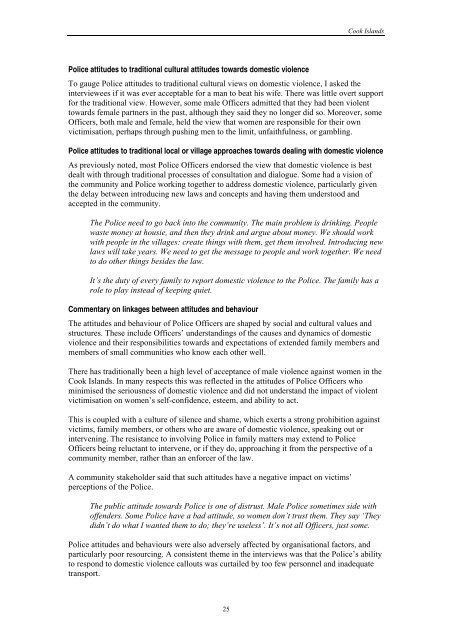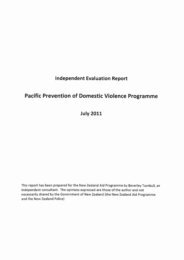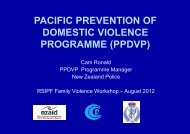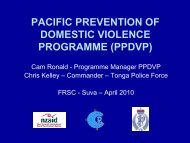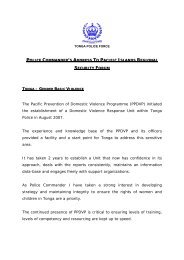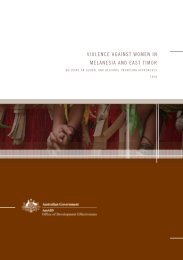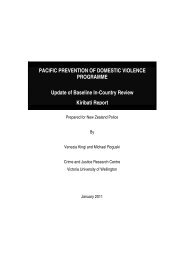Cook Islands - Pacific Prevention of Domestic Violence Programme
Cook Islands - Pacific Prevention of Domestic Violence Programme
Cook Islands - Pacific Prevention of Domestic Violence Programme
Create successful ePaper yourself
Turn your PDF publications into a flip-book with our unique Google optimized e-Paper software.
<strong>Cook</strong> <strong>Islands</strong><br />
Police attitudes to traditional cultural attitudes towards domestic violence<br />
To gauge Police attitudes to traditional cultural views on domestic violence, I asked the<br />
interviewees if it was ever acceptable for a man to beat his wife. There was little overt support<br />
for the traditional view. However, some male Officers admitted that they had been violent<br />
towards female partners in the past, although they said they no longer did so. Moreover, some<br />
Officers, both male and female, held the view that women are responsible for their own<br />
victimisation, perhaps through pushing men to the limit, unfaithfulness, or gambling.<br />
Police attitudes to traditional local or village approaches towards dealing with domestic violence<br />
As previously noted, most Police Officers endorsed the view that domestic violence is best<br />
dealt with through traditional processes <strong>of</strong> consultation and dialogue. Some had a vision <strong>of</strong><br />
the community and Police working together to address domestic violence, particularly given<br />
the delay between introducing new laws and concepts and having them understood and<br />
accepted in the community.<br />
The Police need to go back into the community. The main problem is drinking. People<br />
waste money at housie, and then they drink and argue about money. We should work<br />
with people in the villages: create things with them, get them involved. Introducing new<br />
laws will take years. We need to get the message to people and work together. We need<br />
to do other things besides the law.<br />
It’s the duty <strong>of</strong> every family to report domestic violence to the Police. The family has a<br />
role to play instead <strong>of</strong> keeping quiet.<br />
Commentary on linkages between attitudes and behaviour<br />
The attitudes and behaviour <strong>of</strong> Police Officers are shaped by social and cultural values and<br />
structures. These include Officers’ understandings <strong>of</strong> the causes and dynamics <strong>of</strong> domestic<br />
violence and their responsibilities towards and expectations <strong>of</strong> extended family members and<br />
members <strong>of</strong> small communities who know each other well.<br />
There has traditionally been a high level <strong>of</strong> acceptance <strong>of</strong> male violence against women in the<br />
<strong>Cook</strong> <strong>Islands</strong>. In many respects this was reflected in the attitudes <strong>of</strong> Police Officers who<br />
minimised the seriousness <strong>of</strong> domestic violence and did not understand the impact <strong>of</strong> violent<br />
victimisation on women’s self-confidence, esteem, and ability to act.<br />
This is coupled with a culture <strong>of</strong> silence and shame, which exerts a strong prohibition against<br />
victims, family members, or others who are aware <strong>of</strong> domestic violence, speaking out or<br />
intervening. The resistance to involving Police in family matters may extend to Police<br />
Officers being reluctant to intervene, or if they do, approaching it from the perspective <strong>of</strong> a<br />
community member, rather than an enforcer <strong>of</strong> the law.<br />
A community stakeholder said that such attitudes have a negative impact on victims’<br />
perceptions <strong>of</strong> the Police.<br />
The public attitude towards Police is one <strong>of</strong> distrust. Male Police sometimes side with<br />
<strong>of</strong>fenders. Some Police have a bad attitude, so women don’t trust them. They say ‘They<br />
didn’t do what I wanted them to do; they’re useless’. It’s not all Officers, just some.<br />
Police attitudes and behaviours were also adversely affected by organisational factors, and<br />
particularly poor resourcing. A consistent theme in the interviews was that the Police’s ability<br />
to respond to domestic violence callouts was curtailed by too few personnel and inadequate<br />
transport.<br />
25


